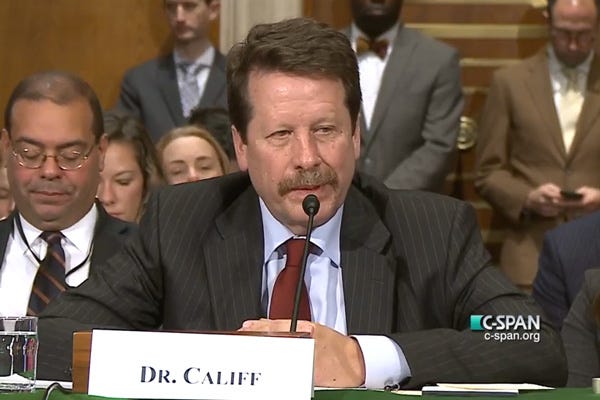FDA Commissioner Nomination Is Now on Hold
December 9, 2015
Robert Califf, MD, is now facing questions for his handling of a clinical trial and his role approving genetically modified salmon.
Qmed Staff
|
Robert Califf, MD, sat through a nomination hearing on November 17. Image courtesy of C-Span. |
The questions of how a medical device was used in a clinical trial and how the agency approved genetically modified fish have landed FDA commissioner nominee Robert Califf, MD, in some hot water. The Senate HELP committee had expected to vote on his confirmation after it closed its docket on November 24, but his nomination is on hold, according to the Alaska Journal of Commerce.
Califf helped manage a clinical trial at the heart of an investigation into the popular blood thinner Xarelto, but a medical device error may have distorted results in favor of Johnson & Johnson and Bayer.
During his confirmation hearing, Califf stressed the importance of post-market surveillance for drugs and devices.
The drug Xarelto has been targeted in lawsuits from more than 3000 plaintiffs in the United States, who allege that the drug is responsible for a host of adverse events including abdominal bleeding and blood clots that entire can cause strokes or heart attacks.
Both the FDA and European Medicines Agency are reviewing data from the ROCKET-AF study, according to Stat News. The study, performed at Duke Clinical Research Institute, was used to convince FDA to approve Xarelto, which had almost $3.7 billion in sales last year. During the trial, Califf co-chaired the executive committee for the clinical trial.
The EMA has said it "is currently investigating whether the data generated from the INRatio device could have had any impact on the trial results and the extent of this impact, if applicable."
When FDA was reviewing the drug, a report from FDA staff concluded that patients taking Xarelto could be "at greater risk of harm from stroke and/or bleeding" than if they were treated with warfarin, which has been commercially available since the 1950s.
In the advisory committee hearing meeting related to the drug held on September 8, 2011, Norman Stockbridge, MD, PhD, director of FDA's division of cardiovascular and renal drug products at CDER explained that, "By at least one analysis, rivaroxaban was superior to warfarin in the ROCKET AF study. Nevertheless, [FDA's clinical reviewers] questioned whether the study can be interpreted as showing that rivaroxaban is even as good as warfarin."
FDA deputy division director Stephen M. Grant pointed to similar problems in evaluating the drug for approval. "The decision was made difficult by the limitations in the design and conduct" of the clinical trial, he was quoted as saying in a November 2011 memo hosted by POGO. The memo also states that "lack of care in designing and conducting ROCKET could have resulted in some XARELTO subjects suffering unnecessary strokes."
In related news, Califf's nomination to head the FDA has been put on hold owing to controversy about labelling of genetically modified salmon, according to the Alaska Journal. Senator Lisa Murkowski (R-AK) vowed that she "will not stand back and just watch these genetically engineered creatures be placed in our kitchens and on our tables without a fight," and that she would work to block the confirmation of Califf, for his role in approving what she calls the "frankenfish, which she says need to be labelled.
Seafood is a $5.8-billion-a-year industry for Murkowski's state, and Alaska has one of the largest salmon fisheries in the world, according to the Alaska Department of Fish and Game.
On November 19, FDA announced new guidance documents for companies making genetically modified food and announced its approval of the first approval for a genetically engineered animal intended for food, AquAdvantage Salmon.
Learn more about cutting-edge medical devices at MD&M West, February 9-11 at the Anaheim Convention Center in Anaheim, CA. |
Like what you're reading? Subscribe to our daily e-newsletter.
About the Author(s)
You May Also Like


.png?width=300&auto=webp&quality=80&disable=upscale)
